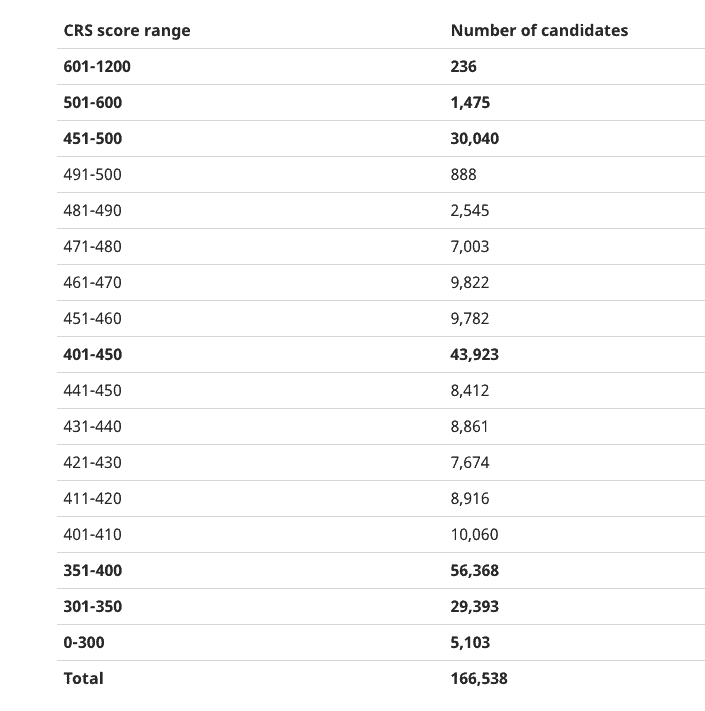How to Increase the CRS Score in the Comprehensive Ranking System?
CRS is used to determine the ranking order of the candidates who apply for immigration through the Express Entry system. This article will give you an overview of how CRS works.
RELATED ARTICLES
Do you qualify for Express Entry to Canada?
The CRS score consists of four buckets that are described below. The score for each bucket is subject to a maximum score. The bucket scores are added together in the end to obtain the final CRS score. The four buckets are:
- Core (of Human Capital) Factors Bucket: This bucket has a maximum score of 460 (if you apply with a partner) or 500 (if you apply without a partner), which are based on factors that predict an immigrant’s economic success in Canada (such as work experience; age, education, language skills);
- Spouse Factors Bucket: If an applicant includes a spouse or common-law partner in his or her Express Entry profile then various spousal skill factors (such as age, education, etc.) are considered. This bucket has maximum of 40 points. If the spouse or common-law partner is not included in the profile then these 40 points become part of the applicant's skill factor score;
- Skill Transferability Factors Bucket: This bucket has a maximum of 100 points. It involves transferability of skills that amplify the core set; and
- Other Factors Bucket: This bucket has a maximum of 600 points. Note that the maximum possible 600 points are automatically awarded to PNP nominees in this bucket. As a result, in most cases PNP nominees immediately move to the top of the CRS ranking. For candidates who are not PNP nominees, other factors that evaluate the candidates connection to Canada are used to award points.
FACTORS
MAXIMUM POINTS
Applying with a spouse or a common-law partner
Applying without spouse or common-law partner
460
500
- Age
100
110
- Level of Education
140
150
- Proficiency in English or French
150
160
- Canadian work experience
70
80
40
- Spouse’s or partner’s level of education
10
- Spouse’s or partner’s language proficiency in English or French
20
- Spouse’s or partner’s Canadian work experience
10
100
- With good/strong official languages proficiency and a post-secondary degree
50
- With Canadian work experience and a post-secondary degree
50
- With good/strong official languages proficiency (Canadian Language Benchmark [CLB] level 7 or higher) and foreign work experience
50
- With Canadian work experience and foreign work experience
50
- With good or strong official languages proficiency and a certificate of qualification
50
600
- Brother or sister living in Canada (citizen or permanent resident)
15
- French language skills
50
- Post-secondary education in Canada
30
- A valid job offer
200
- Provincial nomination under PNP. Candidates who have a provincial nomination receive an additional 600 points in the Comprehensive Ranking System (CRS), which is usually sufficient to trigger an invitation to apply (ITA) at the next round of invitations.
600
TOTAL
1,200
The CRS score is not static; an applicant can improve it by providing more information or updating previously provided information in his or her profile. Candidates should take steps to improve their CRS score and thereby increase their chance of being selected for the next stage. Here are some tips on how you can improve your score (contact our team to learn more):
- Get a valid job offer in Canada.
- Apply for a Provincial Nominee Program and try to get a provincial nomination.
- Take or retake your language test to get the maximum score on this factor.
- Learn a second official language of Canada (either English or French).
- Gain more relevant work experience.
- Wisely select the principal applicant if you apply with your spouse or common-law partner.
- Try to improve your level of education, or obtain an Educational Credential Assessment (ECA) for your foreign degree.
Contact us, and our team of professionals will assess your credentials. We will provide you a realistic assessment of your chances of success and assist you in creating the best pathway for immigrating to Canada. We will explain how to avoid the pitfalls and improve your credentials in order to get the highest possible CRS score which will increase your chance of getting a permanent resident status in Canada.

